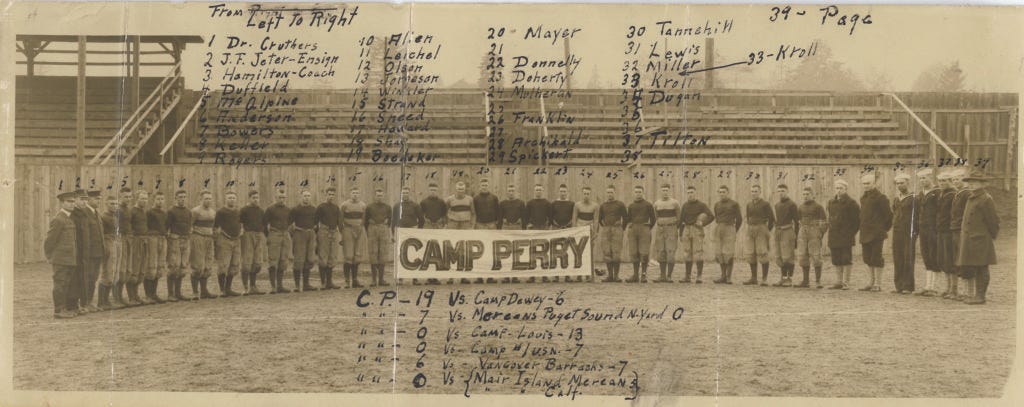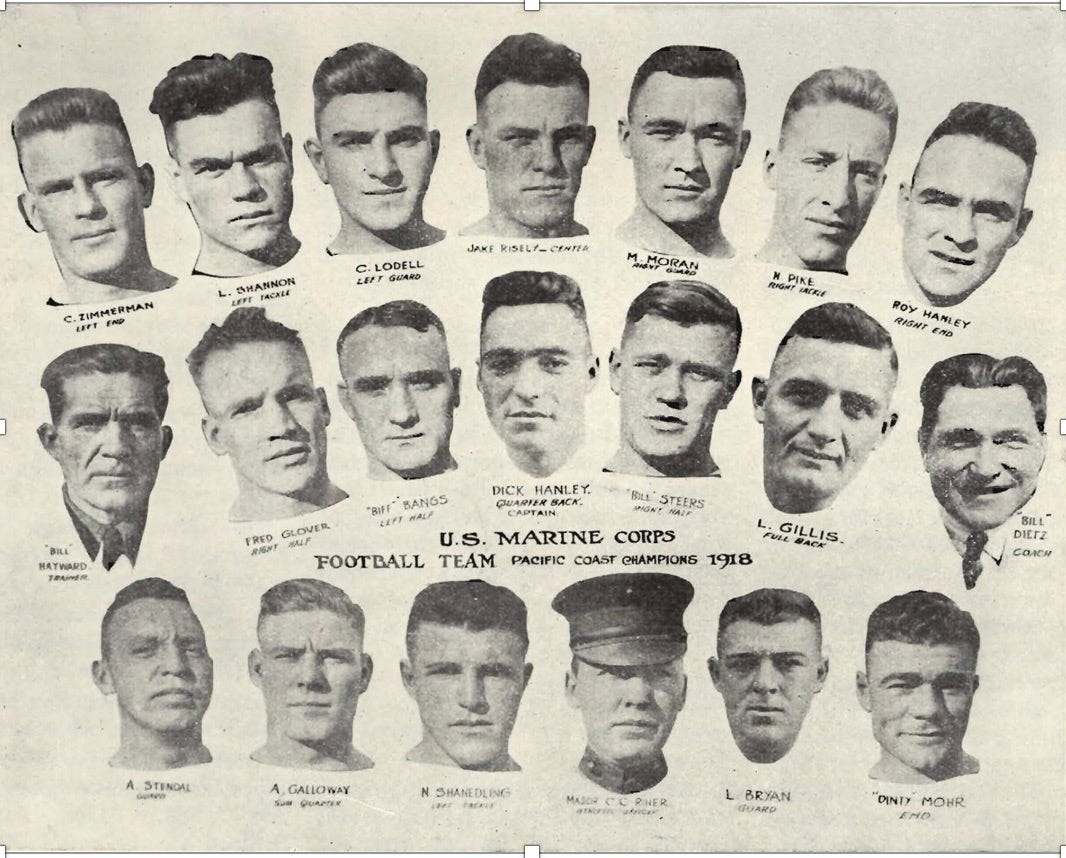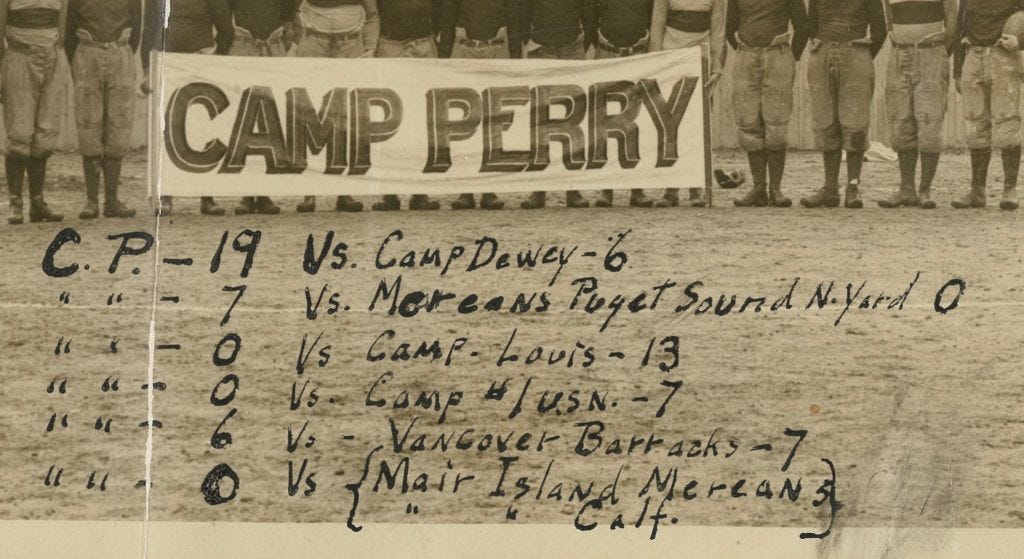On the Wrong End of a Buy Game: 1918 Edition
This article is a collaborative effort between Bud Brooks and Tim Brown. See below for more information about Bud Brooks.
Covid-19 has wreaked havoc on sports schedules this year. Delays, cancellations, and unlikely matchups have been the hallmarks of the 2020 football season. Just as teams have made last-minute schedule changes this year, the same occurred in the fall of 1918 when the second wave of the Spanish Flu roared across the country. Two such teams, the Mare Island Marines of Vallejo, California, and Camp Perry's sailors of Bremerton, Washington, played one another one-hundred and two years ago today, on December 6, 1918.
The Mare Island Marines had the best football program in America during WWI, given that they played in the Rose Bowl following both the 1917 and 1918 seasons. Like virtually every military installation across the country, Mare Island played colleges, independent teams, and other military facilities. While the San Francisco area provided plenty of possible opponents, the Marines traveled to the Northwest both seasons in search of opponents and publicity for the Corps. Importantly, Uncle Sam did not fund the sports teams that popped up at the country's military bases. The teams were self-funded, relying on donations and gate receipts to pay the bills. The teams that traveled extensively had numerous bills, making financial arrangements a significant factor in their scheduling decisions.
While Mare Island had top teams in 1917 and 1918, the 1918 roster was entirely new. The Marines of the 1917 team were in France, flight training, or scattered to the many locations Marines were sent at the time. Nonetheless, their Athletic Officer, Capt. Lynn Coovert, scheduled a strong slate of early-season games near home before their planned multi-week tour of the Northwest. Given the team's self-funding, Coovert prioritized games with teams whose split of the gate or guaranteed fees could pay the Marines' travel expenses.
Mare Island began the season in late September by soundly defeating two Bay-area military teams. However, after returning to Mare Island, the base and the football team went under quarantine for five weeks while the Spanish Flu raged in the area. In November, the season restarted with two quickly arranged games in the Bay area before entraining for Portland to face the Multnomah Athletic Club. Upon arriving in Portland, a dispute over finances led to a last-minute change of opponents. (The local press blamed Coovert for not finalizing the contract details, despite his dealing with his wife and sister-in-law dying of the Spanish Flu during the preceding weeks.)
Mare Island played Camp Lewis on Thanksgiving, and two days later took on the University of Idaho. The Marines outscored their opponents 248-14 leading up to their regular-season finale with Camp Perry, one of several teams at Bremerton Naval Yard near Seattle. Camp Perry's primary qualification as an opponent was the support of their local business leaders, who funded half the $2,000 guarantee needed to attract the Marines to Bremerton.
Camp Perry
Unlike the nation's colleges that fielded football teams before and after the war -and maintained records of their teams- the military shuttered many bases after the war. Those that remained open seldom maintained their wartime sports teams' records, at least to the standard of university archives. Also, larger bases sometimes had multiple teams playing outside competition, which sportswriters of the time failed to distinguish from one another. The combination of issues often make it challenging to determine which team was which and who played whom during the WWI era.
Such was the case with the Bremerton Naval Yard, often referred to as Puget Sound. Although the shipyard remains active today, disentangling its WWI-era football teams proved difficult. It turns out that Bremerton fielded one team among its Marines and two teams among its sailors, with one sailor team representing Camp Dewey and the other Camp Perry.
Sorting out Camp Perry's schedule was made easier by the Camp Perry team photograph below. In addition to identifying most Camp Perry players, the image shows the team's schedule and scores, though the listed scores and opponent names sometimes conflict with period newspaper accounts.

Complicating the issues with the schedule and score, whoever wrote on the image was a poor speller, listing the opponents as the Mereans Puget Sound N. Yard (Puget Sound Naval Yard Marines), Camp Louis (Camp Lewis), Vancover Barracks (Vancouver Barracks), and Mair Island Mereans (Mare Island Marines).
The combination of the images and newspaper accounts tells us Camp Perry won two and lost three games before facing the Marines. Four of those games came against undistinguished competition. Only their 13-0 loss to Camp Lewis came against a high-level opponent. Camp Lewis finished the year with seven wins and two losses, one of which was a 16-0 shutout by the Mare Island Marines. Despite the sometimes failure of the transitive property, Camp Lewis' 16-0 loss to Mare Island and 13-0 win over Camp Perry suggested the sailors would not be a tough matchup for Mare Island. Still, Camp Perry's roster had seven former University of Washington players, an All-American from Minnesota, and a former starting quarterback from Georgia Tech, so they expected to put up a fight.
There was limited newspaper coverage of the Mare Island Marines-Camp Perry contest, but we know the Marines dominated from the start, scoring twenty points in the first quarter and twenty-one in the second. The game became a tad rough in the second half when six Mare Island players left the field with injuries. Perhaps due to the game’s chippiness, the Marines did not let up on Camp Perry, scoring fourteen points in the third quarter while tallying a message-sending thirty-four points in the final stanza for an 89-0 victory. In the end, Camp Perry and its boosters paid almost twenty-two and one-half dollars per Marine point for the pleasure of getting stomped on their home field.
Western Service Championship of 1918 and the 1919 Rose Bowl
Despite the Mare Island Marines being the best football team on the West Coast in 1918, the Rose Bowl felt pressure to consider a different West Coast representative to face the Great Lakes Naval Training Station team hailing from the Chicago area. It seems that in the week leading up to Mare Island's game with Camp Perry, the Rose Bowl's selection committee threw another wrench into the scheduling process by devising a five-team playoff to determine its West Coast representative. The Western Service Championship of 1918 became the first playoff series to determine a major bowl game participant and was the only one until 2014.
Mare Island left Camp Perry undefeated but injury-riddled. Given their battered state, Mare Island supplemented their rosters by arranging the transfer of Millard Calhoun, a running back for the Bremerton Marines contingent, and two Marine linemen from the Philadelphia Naval Yard team. (The war was over by then, so commanders of other bases were open to stocking the Mare Island roster.)
As for the playoffs, the Mare Island Marines faced and beat Mather Field one week after the Camp Perry game, and then set aside Balboa Park Naval Station on Christmas Day to earn their spot in the 1919 Rose Bowl. The three Marine transfers made it to Mare Island and accompanied the team to Pasadena, with one of the linemen starting for the Marines and the other two entering the game as substitutes.
But the late-season free agents were not enough for the Marines against a deep Great Lakes roster whose twenty-two traveling players included three future Pro Football Hall of Famers and ten others that played in the early NFL. As a result, the most tumultuous season in football history -1918 was more chaotic than the 2020 season has proven to be- ended with a 17-0 Mare Island Marines loss to Great Lakes.
This article results from a collaboration with Bud Brooks whose research and writing focuses on the history of football at St. Mark's School of Texas (linked here). Bud's grandfather, Branton H. Henderson, was stationed at Camp Perry during the 1918 football season and might well have attended the Mare Island Marines game.
Click here for options on how to support this site beyond a free subscription.




